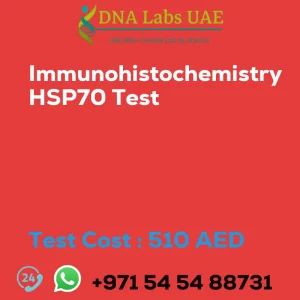IMMUNOHISTOCHEMISTRY Ber-Ep4 EPCAM Test
Cost: AED 500.0
Test Details
The IMMUNOHISTOCHEMISTRY Ber-Ep4 (EPCAM) test is a diagnostic tool used in pathology to detect the presence of the epithelial cell adhesion molecule (EPCAM) in tissue samples. EPCAM is a protein that is commonly expressed in epithelial cells, which are found in the lining of various organs and tissues in the body. The Ber-Ep4 antibody is used in this test to specifically bind to the EPCAM protein. By applying this antibody to tissue samples, pathologists can determine whether the EPCAM protein is present in the cells and visualize its distribution within the tissue.
The IMMUNOHISTOCHEMISTRY Ber-Ep4 (EPCAM) test is commonly used in the diagnosis and classification of various types of cancers, including colorectal, breast, and ovarian cancers. It can help pathologists differentiate between different types of tumors, determine the origin of metastatic tumors, and assess the aggressiveness of the cancer.
The test is performed on tissue samples obtained through biopsy or surgical resection. The tissue samples are typically fixed, embedded in paraffin, and then sliced into thin sections. These sections are then mounted onto glass slides and subjected to a series of staining steps, including the application of the Ber-Ep4 antibody. The stained slides are then examined under a microscope by a pathologist to assess the presence and distribution of the EPCAM protein.
Test Components
- Price: AED 500.0
Sample Condition
Submit tumor tissue in 10% Formal-saline OR Formalin fixed paraffin embedded block. Ship at room temperature. Provide a copy of the Histopathology report, Site of biopsy and Clinical history.
Report Delivery
- Sample: Daily by 6 pm
- Report Block: 5 days
- Tissue Biopsy: 5 days
- Tissue large complex: 7 days
Method
Immunohistochemistry
Test Type
Cancer
Doctor
Oncologist, Pathologist
Test Department
Pre Test Information: Provide a copy of the Histopathology report, Site of biopsy and Clinical history.
Benefits of the IMMUNOHISTOCHEMISTRY Ber-Ep4 EPCAM Test
- Detects the presence of EPCAM protein in tissue samples
- Helps diagnose and classify various types of cancers
- Differentiates between different types of tumors
- Determines the origin of metastatic tumors
- Assesses the aggressiveness of the cancer
- Provides important information for targeted therapies and personalized treatment approaches
| Test Name | IMMUNOHISTOCHEMISTRY Ber-Ep4 EPCAM Test |
|---|---|
| Components | |
| Price | 500.0 AED |
| Sample Condition | Submit tumor tissue in 10% Formal-saline OR Formalin fixed paraffin embedded block. Ship at room temperature. Provide a copy of the Histopathology report, Site of biopsy and Clinical history. |
| Report Delivery | Sample Daily by 6 pm; Report Block : 5 days Tissue Biopsy : 5 days Tissue large complex : 7 days |
| Method | Immunohistochemistry |
| Test type | Cancer |
| Doctor | Oncologist, Pathologist |
| Test Department: | |
| Pre Test Information | Provide a copy of the Histopathology report, Site of biopsy and Clinical history. |
| Test Details |
The IMMUNOHISTOCHEMISTRY Ber-Ep4 (EPCAM) test is a diagnostic tool used in pathology to detect the presence of the epithelial cell adhesion molecule (EPCAM) in tissue samples. EPCAM is a protein that is commonly expressed in epithelial cells, which are found in the lining of various organs and tissues in the body. The Ber-Ep4 antibody is used in this test to specifically bind to the EPCAM protein. By applying this antibody to tissue samples, pathologists can determine whether the EPCAM protein is present in the cells and visualize its distribution within the tissue. The IMMUNOHISTOCHEMISTRY Ber-Ep4 (EPCAM) test is commonly used in the diagnosis and classification of various types of cancers, including colorectal, breast, and ovarian cancers. It can help pathologists differentiate between different types of tumors, determine the origin of metastatic tumors, and assess the aggressiveness of the cancer. The test is performed on tissue samples obtained through biopsy or surgical resection. The tissue samples are typically fixed, embedded in paraffin, and then sliced into thin sections. These sections are then mounted onto glass slides and subjected to a series of staining steps, including the application of the Ber-Ep4 antibody. The stained slides are then examined under a microscope by a pathologist to assess the presence and distribution of the EPCAM protein. The IMMUNOHISTOCHEMISTRY Ber-Ep4 (EPCAM) test is a valuable tool in cancer diagnosis and treatment planning. It provides important information about the molecular characteristics of tumors and helps guide targeted therapies and personalized treatment approaches. |







